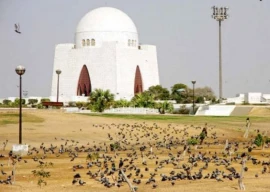
Now Pope Gregory XIII, after whom the calendar was named when he decreed in 1582 that the Julian calendar, much used in Christendom at the time, should be reformed so as to imitate the Council of Nicae, 325 AD — when the relationship between Jesus and God, was settled among other things — had certainly no idea that the Hindu, Hebrew, Islamic, Persian, Tibetan and the Chinese peoples had already figured out their own ways of allocating time and tides.
The Islamic calendar, for example, in use in large parts of the world, from Indonesia to Arabia, commemorates the emigration, or the ‘Hijra’, of the Prophet Muhammad (pbuh) from Makkah to Medina in 622 AD. Anything that came afterward was marked AH, for the Latin Anno Hegirae. But what few people, even in the Islamic world, know is that the Islamic calendar is really a lunar calendar, which means it is synchronised to the motion of the moon, not the seasons. Which means that the month is 28 days long, not 30-31 as the Gregorians would have it.
This lunarity is common to the calendars of the Hindu and Chinese faiths, both of which are ‘luni-solar’ in character. In India, just so as to complicate matters, there are several additional calendars that represent different regions. For example, only in Kerala, the newborn is given its name on the 28th day, coinciding with the completion of the first lunar month.
Festivals like Holi and Diwali — which culminate after several days of feasting and fasting, just like Ramazan is followed by Eid — are also lunar in character, but ‘Baisakhi’, the Hindu new year, always falls on the solar April 13-14.
Notwithstanding the good Pope Gregory, several Middle European countries, like Russia, still retain characteristics of the Julian calendar (the Russian Tsars were ‘Julian’, which is why the October Revolution of 1917 is still known by that month, although it falls in early November) such as Orthodox Christmas, which culminates on January 7. That’s a whole week away, so don’t put away the tinsel just yet.
Spare a thought, meanwhile, for Aasia Bibi, of the Christian faith, to whom the Julian and the Gregorian must seem totally irrelevant as she awaits the casting of the dice that will grant her life or uphold her death by hanging. Although Aasia has been accused of blaspheming the Prophet (pbuh), her case harks back to an older sin that plagues the entire subcontinent, that of caste pollution.
Aasia was considered ‘unclean’ by her fellow Muslim workers, so they didn’t accept water from her hands, although both Christian and Islamic faiths do not accept the Hindu division and countless sub-division into the hierarchy of castes, believing it diminishes the man. An altercation may have followed.
Like Aasia, millions of Dalit Hindus in India have converted to Christianity and Islam, hoping to escape from this numbing casteism. Like Aasia, their past follows them in their new faiths too.
For all of them it’s hardly a happy new year.
Published in The Express Tribune, January 2nd, 2011.
1731570357-0/elon-musk-(1)1731570357-0-405x300.webp)
-(1)1717678110-0/Kendrick-(1)-(1)1717678110-0-165x106.webp)



1732428532-0/BeFunk_§_]__-(43)1732428532-0.jpg)




1725254039-0/Untitled-design-(24)1725254039-0-270x192.webp)






COMMENTS (7)
Comments are moderated and generally will be posted if they are on-topic and not abusive.
For more information, please see our Comments FAQ